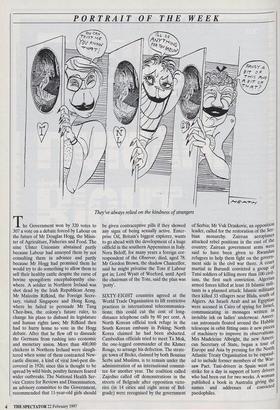PORTRAIT OF THE WEEK
They've always relied on the kindness of strangers The Government won by 320 votes to 307 a vote on a debate forced by Labour on the future of Mr Douglas Hogg, the Minis- ter of Agriculture, Fisheries and Food. The nine Ulster Unionists abstained partly because Labour had annoyed them by not consulting them in advance and partly because Mr Hogg had promised them he would try to do something to allow them to sell their healthy cattle despite the curse of bovine spongiform encephalopathy else- where. A soldier in Northern Ireland. was shot dead by the Irish Republican Army. Mr Malcolm Rifkind, the Foreign Secre- tary, visited Singapore and Hong Kong, where he failed to persuade Mr Tung Chee-hwa, the colony's future ruler, to change his plans to disband its legislature and human rights laws; Mr Rifkind then had to hurry home to vote in the Hogg debate. After that he flew off to dissuade the Germans from rushing into economic and monetary union. More than 400,000 chickens in Northern Ireland were slaugh- tered when some of them contracted New- castle disease, a kind of viral fowl-pest dis- covered in 1926; since this is thought to be spread by wild birds, poultry farmers feared wider outbreaks. The National Health Ser- vice Centre for Reviews and Dissemination, an advisory committee to the Government, recommended that 11-year-old girls should be given contraceptive pills if they showed any signs of being sexually active. Enter- prise Oil, Britain's biggest explorer, wants to go ahead with the development of a huge oilfield in the southern Appennines in Italy. Nora Beloff, for many years a foreign cor- respondent of the Observer, died, aged 78. Mr Gordon Brown, the shadow Chancellor, said he might privatise the Tote if Labour got in; Lord Wyatt of Weeford, until April the chairman of the Tote, said the plan was 'potty'.
SIXTY-EIGHT countries agreed at the World Trade Organisation to lift restrictive practices in international telecommunica- tions; this could cut the cost of long- distance telephone calls by 80 per cent. A North Korean official took refuge in the South Korean embassy in Peking; North Korea claimed he had been abducted. Cambodian officials tried to meet Ta Mok, the one-legged commander of the Khmer Rouge, to arrange his defection. The strate- gic town of Brcko, claimed by both Bosnian Serbs and Muslims, is to remain under the administration of an international commit- tee for another year. The coalition called Zajedno called off demonstrations in the streets of Belgrade after opposition victo- ries (in 14 cities and eight areas of Bel- grade) were recognised by the government of Serbia; Mr Vuk Draskovic, an opposition leader, called for the restoration of the Ser- bian monarchy. Zairean aeroplanes attacked rebel positions in the east of the country; Zairean government arms were said to have been given to Rwandan refugees to help them fight on the govern- ment side in the civil war there. A court martial in Burundi convicted a group 0. f Tutsi soldiers of killing more than 100 civil- ians, the first such conviction. Algerian armed forces killed at least 16 Islamic mili- tants in a planned attack; Islamic militants then killed 33 villagers near Blida, south of Algiers. An Israeli Arab and an Egyptian were accused in Cairo of spying for Israel, communicating in messages written 1.11 invisible ink on ladies' underwear. Ameri- can astronauts floated around the Hubble telescope in orbit fitting onto it new pieces of machinery to improve its observations: Mrs Madeleine Albright, the new Ameri- can Secretary of State, began a tour of Europe and Asia by pressing for the North Atlantic Treaty Organisation to be expand- ed to include former members of the War- saw Pact. Taxi-drivers in Spain went on strike for a day in support of lorry drivers who had been out for two weeks. A woman published a book in Australia giving the names and addresses of convicted paedophiles.


























































 Previous page
Previous page